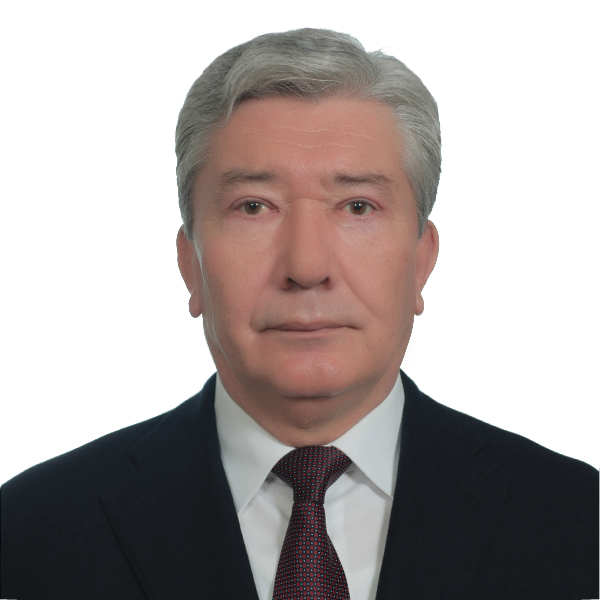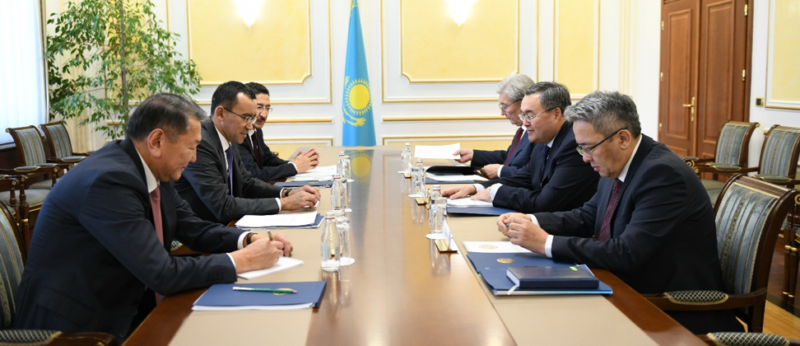 The Foreign Policy Research Institute (FPRI), a special body established last year under the Ministry of Foreign Affairs of the Republic of Kazakhstan, should make a significant contribution to addressing this important issue. FPRI aims to become a reliable analytical tool for choosing the path for development in the context of global change. Indeed, we are witnessing how the world is facing a wide range of geopolitical, economic, social and technological transformations, unexplored opportunities and new risks.
The Foreign Policy Research Institute (FPRI), a special body established last year under the Ministry of Foreign Affairs of the Republic of Kazakhstan, should make a significant contribution to addressing this important issue. FPRI aims to become a reliable analytical tool for choosing the path for development in the context of global change. Indeed, we are witnessing how the world is facing a wide range of geopolitical, economic, social and technological transformations, unexplored opportunities and new risks.
We are observing that the rapid consolidation of new global centers of power is swiftly and unpredictably changing the geopolitical landscape and creating uncertainty. As a result, the ongoing transformation is leading to a crisis of consensus in the world and changing the previous balance of power. In this new geopolitical environment, there is a dynamic redistribution of global influence. The emerging multipolar order has not yet made the international system more stable.
Carrying out an extensive foreign policy requires thorough professional expertise and forecasting. This is due to the fact that the dynamics of global changes are significantly ahead of the understanding of their possible consequences. We see that despite many years of effort of the global community, rivalry, crises and armed conflicts still exist. One of the consequences of growing competition is the dismantling of global institutions and arrangements in the field of international security.
Despite the ever-increasing connectivity and interdependence in the economy, the global economic agenda is also in deep crisis. Our world is still extremely politically divided by many different challenges of cultural, religious, and ideological nature. Current trends offer a variety of future scenario models.
The sense of the inevitable change of historical scenery is growing, as well as the understanding that solving this whole range of challenges requires completely new, innovative approaches and a different level of international coordination of efforts. Seemingly, nowadays the responsibility for a clear definition of new challenges and the search for a practical response lies primarily with political leaders, diplomats and intellectuals.
And it is quite obvious that in such uncertain and rapidly changing conditions for stable development of the state, the value of analytical and forecasting work in global politics significantly increases. First and foremost, the intellectual support of politics is connected with analytical structures, such as think tanks.
According to the Global Go To Think Tank Index Report, a special ranking by the University of Pennsylvania in the USA, more than 6,500 think tanks of various formats and degrees of influence are currently operating across the globe. Gradual increase in their numbers suggests that the demand for expertise and impartial analysis continues to grow.
This is understandable, since such organizations with their competence and work contribute to bridging the gap between accumulated knowledge in the scientific community and necessity to act in politics. Therefore, the driver of modern think tanks is a direct guide to action and implementation of their analytical developments.
As a rule, think tanks develop original new ideas, as well as hold public discussions on issues important to the state. They have high political and research qualifications and always act at the intersection of science and practical work. The function of such centers is to conduct a comprehensive political review, generate new concepts, and prepare forecasting and analytical materials and basic theoretical and applied research for their consumers.
Today, there is also a tendency towards specialization of think tanks, where they focus on a specific area, in a geographical or functional direction. Given the steady trend towards internationalization of all spheres of life, the role of think tanks is now more significant than ever in the field of foreign policy and international cooperation.
What is the difference between think tanks and classical academic scientific institutes? The evidence from practice shows that the resulting work of think tanks is distinguished by a strategic vision of the processes under study, based on conceptual ideas about the desired results in the process of changes in one or another sphere. Thus, the work of such organizations is based on a certain ideology.
In this regard, the activity of the Foreign Policy Research Institute is aimed directly at the forecasting and analytical support of the foreign policy of our country and the entire international agenda of Kazakhstan. The Institute is fully integrated into the system of the Foreign Affairs and through research works on the practical implementation of the provisions of the Foreign Policy Concept.
Thus, the Institute under the Foreign Ministry is specially organized as a competent center for applied research, focused on a substantive study of current and future trends in global development. FPRI was established based on the best practices of similar structures successfully operating under the Foreign Ministries of different countries of the world.

And, it seems, the timeliness of creating such a specialized center in Kazakhstan is clear.
After all, Kazakhstan is known as a very proactive participant in interstate relations. Over several decades, domestic diplomacy has gone through a dynamic evolutionary path and has accumulated substantial baggage at various levels of international cooperation. Today, a systematic comprehension of this experience is required, and this experience shall be used as an effective resource in the further economic and political development of the state at a new stage in world history.
In October 2019, the first meeting of the Institute’s Board of Directors chaired by the Minister of Foreign Affairs of Kazakhstan, Mukhtar Tleuberdi, devoted to a discussion of conceptual approaches to the Institute’s activities was held. The Institute has formed a highly professional scientific team. It consists of Kazakh career diplomats who have practical knowledge of world politics “behind-the-scenes”, as well as experienced international experts trained in advanced research methods. In turn, the regular operational interaction of the Institute’s employees with the staff of the central office and foreign agencies helps to enhance the human resource capacity of the Ministry of Foreign Affairs of Kazakhstan.
This gives confidence that conclusions and practical recommendations on key issues, including the scientific development of responses to emerging challenges for national interests and the development of our country, the creation of early warning methods and minimization of the negative effects of regional risks and ensuring Kazakhstan’s national interests and strategic objectives in world affairs, will be timely and in demand.
“Foreseeing trends and developing solutions” – this is how we can summarize the professional approach of our Institute. It reflects the mission of FPRI to become a reliable source of ideas to ensure the foreign policy of the state, as well as an effective tool for information and analytical support of the leadership of Kazakhstan. In this regard, the Institute has identified a number of priority areas.
First of all, the work is focused on regional research and the study of external partners of Kazakhstan to understand the features of their current and future development. The world does not stand still, regional processes in various parts of the world have come into motion, and many partners of Kazakhstan have entered a new historical cycle. FPRI is aimed at promoting the national interests of Kazakhstan and finding new beneficial areas of cooperation in changing realities.
A special part of the Institute’s work is the comprehension of global processes in the 21st century, the analysis of critical changes in politics and economy from the perspective of long-term interests of Kazakhstan. Pessimistic assessments of the world situation prevail today in the vast majority of cases. FPRI is focused not only on the operational and in-depth diagnosis of risks and dangerous areas in world politics, but also on the search for development opportunities and alternative cooperation scenarios.
An important area of the Institute’s work is the analytical support of the global ideas and strategic initiatives of the First President of Kazakhstan – Leader of the Nation, and the current President of Kazakhstan. This includes a wide range of issues of economic cooperation, inter-civilization dialogue, global development, nuclear security, counter-terrorism, conflict resolution, peacekeeping and geopolitical stability. These ideas are the conceptual core of the foreign policy of Kazakhstan, and FPRI will contribute to their promotion under the new international conditions.
The analysis of a wide range of transnational challenges and opportunities will allow the Institute to further improve Kazakhstan’s foreign policy activities in top-priority country and thematic areas. The Institute is studying the new driving forces of world politics, including defense, energy, biotechnology, aging populations, trade, the changing role of religion and the importance of new technologies.
The answer to the question “What awaits us in the coming years and decades?” requires an assessment of the state of today’s world. In general, in its activities, FPRI seeks to introduce a novel and a large-scale picture of the most important and acute problems of our time, contributing to the formation of a new strategic agenda for security and cooperation. The priority is to work towards solving major challenges that can have a significant impact on the long-term development of Kazakhstan.
FPRI’s particular attention is given to the development of strategic communications of Kazakhstan with partner countries. Scientific diplomacy will play an important role in this through joint publications, conferences and expert discussions on world order problems, on a common search for ways to resolve regional crises, and on the study of the issues of sustainable development of states and the world as a whole.
By publishing the results of individual studies, conducting events, as well as interacting with domestic and foreign expert communities and the media, the Institute will inform the Kazakh and foreign public about the international situation, foreign policies and achievements of Kazakhstan, interpret events taking place in the world based on their potential impact on the development of Kazakhstan.
In general, the Institute’s operating tasks are fully correlated with the tasks outlined by the President of Kazakhstan, Kassym-Jomart Tokayev, in his inaugural address on June 12, 2019, which states that“…We will continue on our path of a constructive, balanced, multi-vector foreign policy. We will firmly promote and defend our national interests on the global stage. Our foreign policy will bring concrete benefits to the country, national businesses and every citizen.”
Currently, the Institute is developing in accordance with the established concept, which takes into account the traditions of the foreign ministry of Kazakhstan and new trends that form the agenda of the future. In the long run, it is assumed that the Institute will systematically advance the Kazakhstan school of analytics, based on regional specifics, traditions and objectives of the state development strategy.
We hope that over time, FPRI will establish itself as an in-demand center for the development of ideas and solutions, new approaches, new perceptions and new attitudes towards international processes.
Aimdos Bozzhigitov, Chairman of the Board of the Foreign Policy Research Institute under the Ministry of Foreign Affairs of the Republic of Kazakhstan, Ambassador Extraordinary and Plenipotentiary